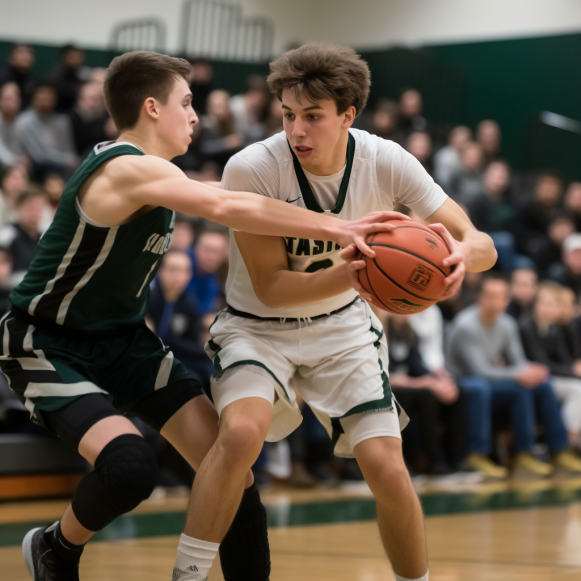Pac-12 lawsuit: New court filings by ‘Pac-2’ schools include examples that USC and UCLA were removed from board
The composition of the governing body is crucial to control of the conference
After USC and UCLA announced their departure from the Pac-12 last fall, the conference office created a “Briefing Book” for the member universities. The digital document, labeled “highly confidential,” included a section titled “Introduction to the Pac-12 Board of Directors” that included the names of the presidents and chancellors, as well as a picture of each. There was no mention of the schools in Los Angeles.
The exclusion of USC’s Carol Folt and UCLA’s Gene Block from the Pac-12’s “Briefing Book” exemplifies how the Pac-12 treated the outgoing schools’ presidents and chancellors — treatment that is now at the heart of a legal dispute over conference control.
The latest development occurred Wednesday in Whitman County (Wash.) Superior Court, where attorneys for Washington State and Oregon State filed a motion for a preliminary injunction to ensure that the outgoing schools lose their seats, leaving the presidents of WSU and OSU as the Pac-12’s governing board’s only members.
“Today Oregon State and Washington State asked the court to confirm the departing schools lost their Board seats following their notices of withdrawal from the conference,” according to a joint statement released by the two schools.
“The evidence we have uncovered thus far in discovery overwhelmingly shows this is consistent with the position that the conference and the departing members themselves had taken up until just weeks before Oregon State and Washington State were forced to file our litigation.”
That evidence, presented in an expedited discovery process, includes not only the “Briefing Book,” but also two sworn statements by commissioner George Kliavkoff stating that USC and UCLA were removed from the board of directors following the public announcement of their departures on June 30, 2022.
The Hotline discovered and reported on one statement signed by Kliavkoff in a separate legal matter earlier this month. The other statement was part of the same case — a wrongful termination lawsuit filed by two former executives — but had previously not been made public.
“USC and UCLA … were removed as Board representatives under the Constitution and Bylaws following their notice of withdrawal from the Pac-12,” he said.
A request for comment was not returned by the Pac-12.
WSU and OSU’s motion for a preliminary injunction, filed on Wednesday, includes a five-page confidential document (marked Exhibit 36) that includes the following section:
“Supplemental distributions are expected: Subject to due process rights, the Pac-12 may reduce the $105 million distributions to our departing members (Colorado, USC, and UCLA).”
“- Pac-12 bylaws allow the Board to impose fines on members who leave before August 1, 2024.”
“- The Board is considering options, but we are contemplating seeking considerable financial damages against our departing members that could result in supplemental distributions to the remaining 9 universities.”
(This is the only section of the document that can be viewed; everything else is redacted.)
Attorneys for Washington State and Oregon State are attempting to demonstrate that the conference systematically removed schools from the board once they agreed to join other leagues — and that the departure of ten universities leaves the Cougars and Beavers as the only legitimate members of the board.
They obtained a temporary restraining order from Whitman County Judge Gary Libey in September, preventing the full board from meeting until the makeup is determined. A preliminary injunction hearing on the matter is set for November 14.
(According to court records, the remaining ‘Pac-2’ schools and outbound ‘Pac-10’ universities have agreed to mediation under former U.S. District Judge Layn R. Phillips while the lawsuit is ongoing.)
“We did not create or seek these circumstances, but OSU and WSU will continue to take whatever actions are necessary to protect our universities,” the two universities said in a joint statement. “The future of the Pac-12 should be decided by the schools that stay, not those that leave.”
Following the mass exodus in early August, the Cougars and Beavers are considering rebuilding the conference (with Mountain West schools) but are concerned that the ten outgoing universities will vote as a bloc in a way that “irreparably” harms WSU and OSU, according to the motion filed Wednesday.
If the two remaining schools are declared the Pac-12’s sole board members, they will have control of the Pac-12’s assets, including more than $50 million in future NCAA Tournament payouts, and will be able to use the money to strengthen their athletic departments and possibly rebuild the league.
The ten schools that will compete in the Big Ten, Big 12, and ACC next summer “are committed to competitors and have no incentive to invest in the Pac-12’s future,” according to the motion.
“Absent a preliminary injunction, nothing would stop the ten departing schools from seizing control of the Conference and distributing its assets to themselves on their way out the door.”
The interpretation of the Pac-12 bylaws is central to the case, which states: “If any member delivers a notice of withdrawal prior to August 1, 2024, in violation of this chapter… the member’s representative to the CEO Group shall automatically cease to be a member of the CEO Group and shall cease to have the right to vote on any matter before the CEO Group.”
The plaintiffs do not believe that withdrawal notice must be “delivered” in the form of a formal, written statement. It could instead take the form of a social media post or a public statement by a university executive.
The plaintiffs also do not believe that the number of departing schools should have any bearing on how the bylaws are applied. Regardless of the number of outgoing institutions, the conference should take the same approach to board composition that it did after the Los Angeles schools announced their departures (i.e., removal).
According to the motion filed on Wednesday, any claim that the ten departing members have not delivered notice of withdrawal is “a lawyer-created contrivance designed to deflect from the fact that the departing schools are directly reversing their prior position because it no longer serves their self-interests.”
The motion cites the following examples of established precedent:
— In the aftermath of the L.A. schools’ announcements that they would join the Big Ten in the summer of 2024, the Pac-12 “convened numerous Board meetings without USC or UCLA’s representatives, where the Board discussed all manner of Conference activities, including: financial updates, revenue distribution models, media rights negotiations, expansion analyses, medical and legal matters, HR actions, plans for the Pac-12’s production facility, and NCAA governance updates, among other things.”
The motion goes on to say that “None of the ten remaining member institutions … ever disputed that USC and UCLA had been rightfully removed from the Board.”
— The distribution of the “Briefing Book” in September 2022, which includes the names and pictures of each board member.
It’s at least 40 pages long and starts with a note from Kliavkoff: “On behalf of the Pac-12 Conference and your fellow Pac-12 presidents and chancellors, I am delighted to welcome you to the Board of Directors, the Conference’s governing board.”
Pictures of the presidents and chancellors can be found on page 15. The briefing book then goes on to describe the board’s “chair rotation.”
Folt from USC and Block from UCLA are not mentioned or pictured.
— A joint public statement issued in February 2023 by “the 10 Pac-12 Conference Board Members,” stating that the “10 Pac-12 universities look forward to consummating successful media rights deal(s) in the very near future.”
— Kliavkoff made two sworn statements in the wrongful termination lawsuit filed in San Francisco by two former Pac-12 executives.
The first was in April, and it read: “Each member institution of the Conference has one representative on the Board which shall be the President of that member institution, except … USC and UCLA who were removed as Board representatives under the Constitution and Bylaws following their notice of withdrawal from the Pac-12.”
The second occurred in July and took the form of a footnote to his declaration: “The University of California, Los Angeles, and University of Southern California are no longer among the member institutions represented on the Board of Directors.”
According to the motion filed on Wednesday, the Pac-12 resubmitted the second sworn declaration as part of the case in San Francisco “on September 20, 2023—nine days after the Court had entered the TRO in this action.”
— A letter from Pac-12 legal counsel Scott Petersmeyer to Colorado chancellor Phil DiStefano in late July, following the Buffaloes’ announcement that they would join the Big 12 the following summer.
The letter states that “Chancellor DiStefano and CU’s representation on the Pac-12’s Board of Directors automatically ceases effective immediately, and CU no longer has the right to vote on any matter before the Board.”
After CU’s announced departure but before the conference’s collapse on Aug. 4, the Pac-12 board met several times without DiStefano.
— On Aug. 5, the day after five more schools announced their departures but before Stanford and Cal accepted membership in the ACC, Kliavkoff “sent a text message to a news reporter acknowledging that ‘(a)s of today we have 4 board members.'”
(The motion did not name the news reporter. The reporter, however, was identified as John Canzano of JohnCanzano.com by the Hotline.)
After excluding USC, UCLA, and Colorado from previous board meetings, Kliavkoff attempted to convene the presidents of all 12 schools a few weeks later.
“After more than a year of adhering to its Bylaws and automatically removing Board representatives of schools that had given notices of withdrawal, the Conference abruptly changed course,” the text of the motion states.
Faced with an uncertain future and fear of being outvoted, Washington State and Oregon State filed separate legal actions: they sought a preliminary injunction to determine the composition of the board and a temporary restraining order to prevent the board from meeting until the composition was determined.
The order was issued by Libey on the same day (September 11).
Washington is attempting to join the lawsuit as the state’s sole outgoing school, a critical step toward eventually having it dismissed.
A hearing on UW’s motion to intervene was scheduled for today, but it has been moved to the Nov. 14 hearing on the preliminary injunction.



